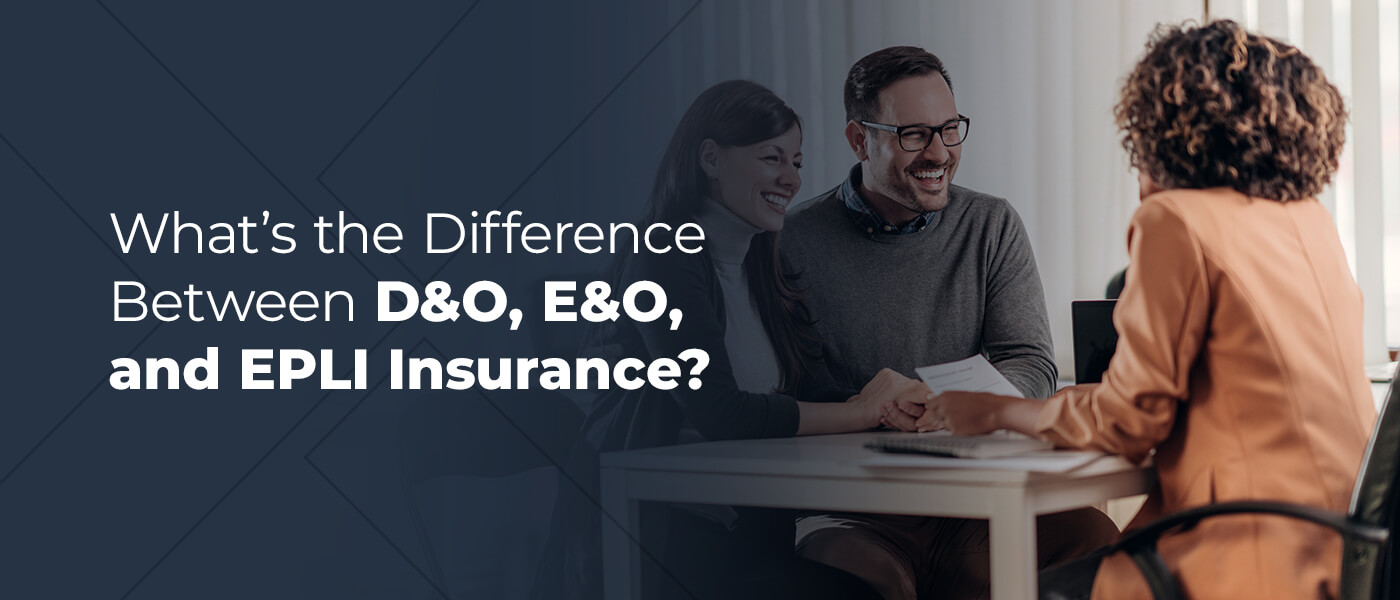
What’s the Difference Between D&O Insurance, E&O Insurance, and EPLI?
Business professionals have many responsibilities. You want to provide outstanding service to your clients while minimizing the risk to your company. Even when you take extensive precautions, problems can occur, leading to a customer lawsuit.
Getting sued might be a conventional part of doing business, but it doesn’t have to lead to financial difficulty for your company. Professional liability insurance may provide financial protection in the event of a lawsuit. Having the right type and amount of liability insurance coverage can keep your business afloat in the event of a lawsuit. Liability coverage comes in various forms with varying levels of protection. Learning the difference can help you decide what’s right for your business.
What Is Errors and Omissions (E&O) Insurance?
Errors and omissions insurance (E&O) is another name for professional liability insurance. E&O insurance means that professionals may have protection if a client feels that they made an error when providing services. This coverage is also known as professional indemnity insurance.
The coverage an E&O insurance policy provides largely depends on the policy itself. Policies may pay for legal fees, administrative fees, and court costs due to liability lawsuits. Policies can also cover the cost of damages or settlement. Whether a policy provides coverage depends on when the rules apply and when the incident occurred. Some E&O policies only cover incidents that happened when the policy was active and that are still current when the client sues.
Professional Liability Coverage
Clients may bring lawsuits against a company for various reasons.
Bad Advice
Many clients rely on professionals, such as attorneys and consultants, to give them valid, usable, and beneficial advice. If a professional provides advice to a client and things don’t meet the client’s expectations, they might sue. For example, if a consultant recommends a factory member make changes to increase efficiency and those slow down production, a client might bring a lawsuit. If an attorney advises a client to sever ties with someone and doing so leads to more difficulties, the client can sue.
Negligence
Negligence occurs when a professional doesn’t provide the usual level of care. For example, if a doctor doesn’t look at a patient’s chart before prescribing a medication the patient is allergic to, a judge can find them negligent. If an investment adviser ignores all warnings about a company’s financial health and recommends stocks that ultimately tank, they can be negligent.
Slander or Libel
If a professional says unfavorable or contradictory things about their client out loud, they commit slander. Negative or false written comments constitute libel. In either case, a client can sue the professional for personal injury.
Omissions
An omission is a failure to mention information that could change a client’s view on a matter. For example, a real estate agent who doesn’t explain that a house sits on a flood plain or had previous extensive damage is committing an omission.
Mistakes
Even the best and most talented professionals make mistakes occasionally. If a client suffers harm due to an error made by an attorney, doctor, accountant, or other professional, they might choose to sue.
Is E&O Insurance The Same As Professional Liability?
Errors and Omissions (E&O) Insurance and Professional Liability Insurance are identical. They are terms often used interchangeably to refer to the same type of insurance coverage, designed to protect professionals and businesses against potential lawsuits from clients who believe they’ve suffered harm due to professional advice or services. The coverage provided by an E&O policy often includes:
- Legal fees
- Administrative costs
- Court costs related to liability lawsuits
- The cost of damages or settlements

What Is Directors and Officers Insurance?
Directors and officers insurance (D&O) is a form of E&O or professional liability insurance. It specifically aims to provide coverage to the directors, officers, executives, and other higher-ups at a company. A typical D&O insurance policy can protect the personal assets of the people who manage or oversee a company.
It’s crucial to note that directors and officers liability insurance usually doesn’t protect a company if the directors or officers commit crimes or illegal acts. Another common misconception about D&O insurance is that it’s only for large, publicly traded companies. In reality, any business with a board of directors, including small, private companies and nonprofit organizations, can benefit from a D&O insurance policy.
There are several reasons someone might sue a director or officer of a company personally.
Poor Financial Management
Directors and officers often have financial sway over a business. If an investor believes a director’s decision adversely affected a company’s financial health, the investor could personally sue the director.
Negligence
Investors, clients, or vendors can also sue directors or officers for negligence. For example, if the board fails to meet or carry out its duties, particularly in a crisis for the company, a client or investor could sue.
Errors
Directors’ or officers’ errors can lead to lawsuits. For example, the board might make claims about the company’s service that turn out not to be true.
Wrongful Acts
A director or officer can commit a wrongful act by mixing their private finances with those of the company or having a conflict of interest that affects their ability to provide service to the business.
What Is Employment Practices Liability Insurance?
While E&O and D&O insurance can provide liability protection for incidents that affect people outside of a company, such as dissatisfied clients or investors, employment practices liability insurance (EPLI) aims to protect a company from claims filed by people who work within it. An employee can sue a company if they believe the company has violated their legal rights.
Some of the reasons a person might sue their employer include:
- Sexual or other forms of harassment
- Discrimination
- Wrongful termination
- Failure to promote or hire
EPLI might be part of a general liability insurance policy or be an add-on to a business owner’s policy. The amount of coverage it provides depends on the company’s size, practices, and employee turnover rate. A business with high employee turnover is likely to pay higher premiums, as there is more risk of getting sued by new hires than by most established employees.
Is E&O Insurance the Same as Professional Liability?
Professional liability is the same as errors and omissions insurance. They are terms often used interchangeably to refer to the same type of insurance coverage, designed to protect professionals and businesses against potential lawsuits from clients who believe they’ve suffered harm due to professional advice or services. The coverage provided by an E&O policy may include:
- Legal fees
- Administrative costs
- Court costs related to liability lawsuits
- The cost of damages or settlements
Who Needs Professional Liability Insurance?
Any business that offers professional services or advice can benefit from professional liability insurance. A few examples include:
- Consultants
- Architects
- Engineers
- Information technology (IT) and tech professionals
- Graphic designers
- Interior designers
- Real estate agents
- Insurance agents
EPLI can benefit all businesses, regardless of size or industry. Companies should consider EPLI, especially if they are more susceptible to the types of claims this insurance can cover. A few sectors that would especially benefit include health care, hospitality, professional services, manufacturing, construction, and retail.
Is Professional Liability Insurance Mandatory?
Federal law does not require businesses to hold professional liability insurance. State laws or restrictions within a particular industry may require you to have this coverage. For example, lawyers, doctors, real estate agents, and insurance agents must often hold this coverage in particular states. Even in industries without particular legal requirements, this insurance coverage is beneficial.
How Is Professional Liability Insurance Different Than General Liability Insurance?
The two types of insurance are designed to cover different risks. Professional and general liability insurance are both types of business insurance meant to protect against financial harm. General liability insurance can cover physical risks like property damage and bodily injury. Professional liability insurance can cover more abstract risks, like errors in the service your business provides.
Together, the two types of business insurance may protect against various potential lawsuits a company may face.
How Much Does Professional Liability Insurance Cost?
Every business will face different costs for professional liability insurance. The cost may depend on several factors, like:
- The type of business you operate and the industry you work in
- The location of your business
- The number of employees on your team
- The number of years in business
- Your business’s claims history
- The coverage limit and deductible you choose
Numerous factors influence your costs. An insurance provider can discuss your options and work with you to find coverage options.
Which Type of Policy Do You Need?
Your business most likely needs some form of liability protection, whether it’s a general E&O policy, D&O, or EPLI. Perhaps your company could benefit from all three types of coverage. As you shop for liability insurance, keep in mind your company’s size, the risks it carries, and who you employ.

Find the Professional Liability Insurance You Need With XINSURANCE
At XINSURANCE, our specialty is helping businesses that can’t get insured elsewhere get the necessary coverage. Whether your company needs professional liability insurance, D&O coverage, or a combination, we can help find a solution. We can also review your existing policies and advise you on expanding your coverage to help meet your insurance needs and give you true peace of mind. Request a quote for professional liability insurance.
 Authored by Rick J. Lindsey, President, Chairman, and CEO of XINSURANCE
Authored by Rick J. Lindsey, President, Chairman, and CEO of XINSURANCE
Rick J. Lindsey hails from Salt Lake City, Utah. He began working in the mailroom of his father’s Salt Lake City insurance firm, getting his introduction to the business that became his lifelong career. Rick J. Lindsey quickly rose through the ranks while working in nearly every imaginable insurance industry job. As an entrepreneur, specialty lines underwriter, claims specialist, risk manager, and a licensed surplus lines broker, Rick J. Lindsey is highly skilled in all levels of leadership and execution. As he progressed on his career path, Rick J. Lindsey discovered an urgent need for insurers willing to write policies for high-risk individuals and businesses. He was frequently frustrated that he could not provide the liability protection these entities desperately needed to safeguard their assets. He also formed the belief that insurance companies acted too quickly to settle frivolous claims. Rick J. Lindsey decided to try a different approach. He started an insurance company and became the newly formed entity’s CEO. This opportunity has enabled Rick J. Lindsey to fill a void in the market and provide a valuable service to businesses, individuals, and insurance agents who write high-risk business. XINSURANCE also specializes in helping individuals and businesses who live a lifestyle or participate in activities that make them difficult for traditional carriers to insure. If you’ve been denied, non-renewed, or canceled coverage, don’t give up quite yet. Chances are XINSURANCE can help.
